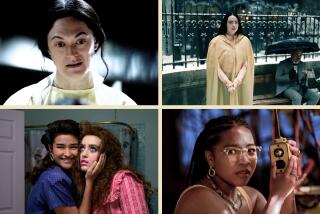Burdening Kids With Innocence
- Share via
Danielle van Dam. Samantha Runnion. Nicole Timmons. Jahi Turner. Alexis Patterson. Jennifer Short. Elizabeth Smart. The list seems endless. This year, child-snatching seems a national epidemic taking on the biblical proportions of Herod’s slaughter of the innocents.
As abhorrent as these crimes are, however, child abductions by nonfamily members remain extremely rare; fewer than 100 cases were reported in 2001 among a national population of 59 million children. So what is at work in the American psyche that makes child abduction our crime du jour?
Pedophilia--”pedo” for child, “philia” for loving--is an unfortunate term to describe aberrant and criminal behavior, but the word’s generality also suggests our wider cultural context of child-loving.
Children have been made objects of desire and attached to products to make those objects desirable: for example, fashion advertisements that feature junior ingenues in various leering states of undress. At even younger ages, irresistibly cute children are celebrated in beauty contests; certainly one of the most haunting pictures of recent years must be that of 6-year-old JonBenet Ramsey strutting her stuff as a cowgirl at one of these kiddie pageants.
In “The Death of Innocence” by John and Patsy Ramsey, JonBenet’s parents assert their innocence in the murder of their daughter and suggest ways they have been smeared to look guilty. But that title also provides a sideways allusion and apt description of what happened to JonBenet, as well as Danielle van Dam and other child murder victims. In fact, the title’s conjunction of death and innocence is something of an explanation of the phenomena of child abduction and murder.
The paradigm for this is a moment in Mary Shelley’s “Frankenstein.” After his creation, the novel’s monster is lonely and wants companionship. In a remote place, a “beautiful child” happens his way, and the monster is filled with hope that this innocent will be uncontaminated by society’s values and not reject him for his ugliness and desires. But the monster is disappointed: The child is seized, struggles violently, calls out to parents and shrieks all the while about the hideousness of the monster. In despair, wishing to silence the child’s voice, the monster grabs the youngster’s throat and, in a moment, a body lies at his feet.
For this paradigm of pedophilia, for this yoking of innocence with death, Shelley might thank Jean Jacques Rousseau. Reacting to religious tradition, this French thinker rejected the idea that children entered this world contaminated by original sin and were essentially beasts until discipline and baptism reshaped them. Turning tradition on it head, Rousseau suggested that children entered the world as innocents and were later contaminated by society and culture.
Of course, either view of the child--as original sinner or original innocent--is equally exaggerated, but it is Rousseau’s view that holds sway over our times. And it is the cultural notion of the child’s emphatic and malleable innocence, Shelley’s novel suggests, that lures the pedophile, then disappoints when discovered not to be true.
Harder to grasp and harder to accept, in both our own time and in Shelley’s, is a more matter-of-fact understanding of children as ordinary, nothing special, just themselves, some good and some bad, and symbol-free.
This creates a problem. Behind our child-loving, psychotherapist Adam Phillips suggests in his book “The Beast in the Nursery,” is a pervasive and unrealistic myth that childhood should be trouble-free and paradisiacal. Most adults, however, realize that their own childhoods were ordinary or flawed.
This feeling of being shortchanged of our share of paradise, Phillips argues, prompts adults to live out through their children, or children in general, a sort of desperate wish that the young have the innocence we lacked.
This living out through children of a mythical and emphatic innocence, which adults feel they missed, creates a horrible burden on children. Not recognized for their ordinariness, children are saddled with our desires and projections. Not incidentally, this is what makes them attractive in advertisements and, in some cases, candidates for abduction. Moreover, as “Frankenstein” suggests, the pedophile’s eventual disappointment may lead to murder.
What the psyche of America now seems obsessed with is innocent deaths and the death of innocence.


